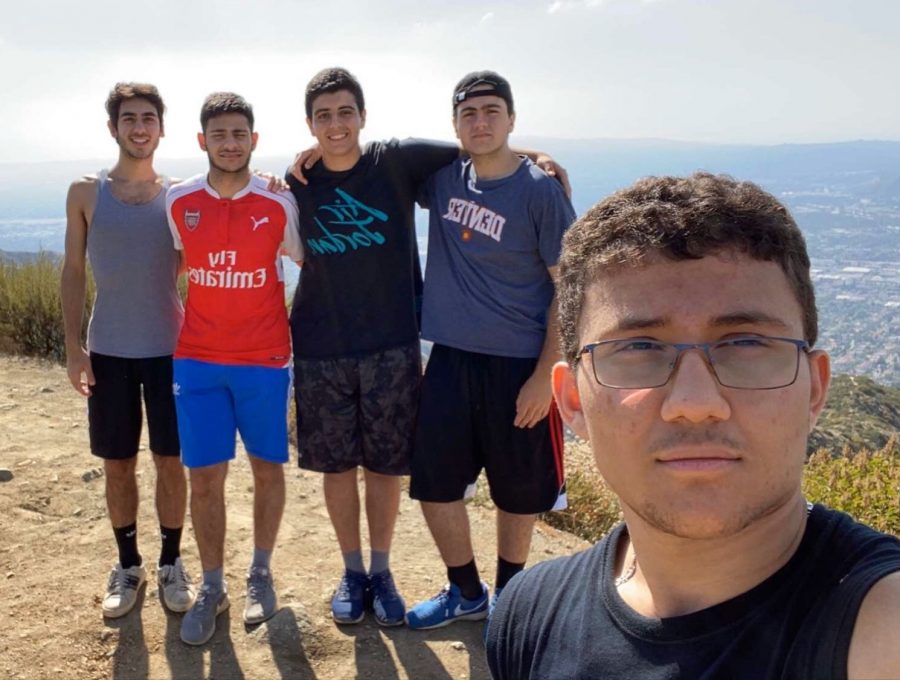The benefits of hiking
Why the mind, body, soul experience of hiking doesn’t compare to other sports
January 28, 2021
You wake up to the crisp aroma of pine. The crunch of gravel under your feet is the only sound. The golden sunrise peeking over the green mountains warms your face and the night air. You stretch your sore muscles and prepare for the trek above.
Hiking tends to get a bad rap. Some view hiking as a rejuvenation of the mind, body, and soul through the disconnect of technology and civilization. Others see it as nothing more than a boring form of torture in which psychotic people subject themselves to. However, hiking can be beneficial and enjoyable to anyone as long as they go into it with the right mindset.
Hiking is unlike any other form of exercise. People tend to argue that the physical benefits of hiking are the same or similar to going on a walk around the block. However, this is completely false. Hiking means walking on uneven terrain which demands more balance and more attention to the task at hand. This essentially means more calories are burned in less time since one’s heart and metabolic rate are increased. Also, according to WebMd, not only is hiking the ultimate cardiovascular workout, it also improves bone density and muscle mass.
High schoolers are experiencing a fair amount of stress, especially senior year when the uncertainty of college looms ahead. Diana Sargsyan, a senior at Clark Magnet High School, recently picked up hiking in her free time. “I was feeling really stressed about college apps and needed an escape,” Sargsyan said. “When I started hiking I immediately noticed that my stress levels went down and I was able to handle problems throughout the day a lot better.”
The benefits of hiking go far past the obvious physical pay off. According to a Stanford University study, hiking can drastically affect mental health. Researchers found that spending time outdoors reduces stress, anxiety and the risk of depression. They came to this conclusion by comparing participants who walked 90 minutes a day in a high-traffic area to participants who walked in a natural area.
Researchers also found that the subgenual prefrontal cortex, the area of the brain responsible for repetitive negative emotions, had a decrease in neural activity. The connection between nature and our mental state is very real and very prominent.
Rafik Akean, from the Armenian Hiking Society, has been hiking and rock climbing since he was a young teenager. He is a firm believer in the healing power of hiking. “Hiking is different from every other type of physical exercise because it’s not only extremely good for your health but it is very good for your mind,” Akean said.
Along with being good for one’s mind, hiking has proven to be beneficial for sleep. The combination of lack of sleep and lack of exercise create a vicious cycle that is hard to break; the obvious reason being not getting enough sleep leaves you unmotivated throughout the day and also builds up stress which increases your likelihood of not sleeping well the next night.
One of the ways one can break out of this cycle is by picking up hiking. Hiking is one of the best aerobic exercises because it engages one’s entire body. Senior Gary Tokatlian goes hiking with his friends on a regular basis. “When I go hiking consistently I notice that my sleep cycle stays consistent too. Like I actually wake up with energy and go to bed tired,” Tokatlian said. Another way hiking can help sleep is by exposing you to natural light. Being exposed to natural light fixates the sleep-wake cycle our body’s have with the sun.
Some of Tokatlian’s friends that go hiking with him also reported that they find that their overall energy levels coincide with the natural times of day when participating in consistent hiking. Hiking not only wears out the body but it wears out the mind. Hikes require a level of alertness for surrounding dangers. Whether it be wild animals or a ridge next to a path, a good hiker is alert and wired to their surroundings. This constant brain activity throughout the day wears out your mind to be more calm when you are trying to sleep.
Hiking has also shown to be helpful for student athletes. Nareh Haroutunian, a senior at Clark, has been juggling school and gymnastics. She has been a strong gymnast for years and has found that regular hikes improve her performance tremendously. “I mean not only does it keep me in shape but it also helps me not burn out in one sport,” Haroutunian said. “When you’ve been doing something for so long finding other ways to stay fit is crucial to not getting bored.”
